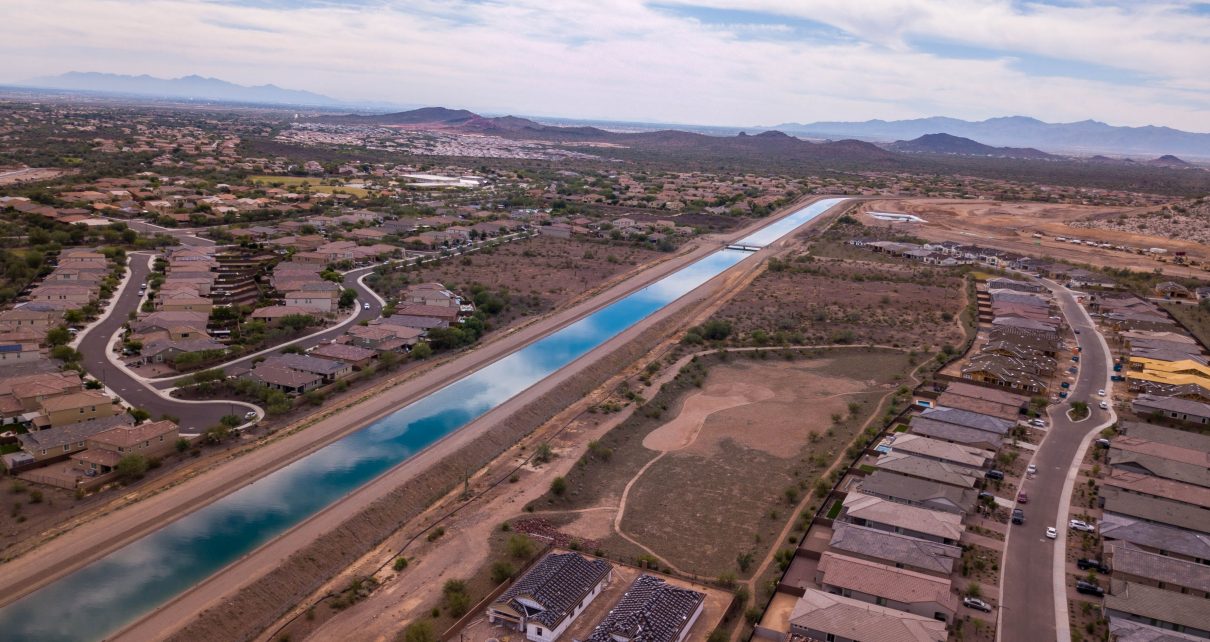
Arizona Water Shortage Impacts Housing (Photo: Shutterstock)
Water Looms Large in Arizona Housing Shortage
100-year water moratorium at the center of another Arizona political debate
By Steve Kirwan, December 26, 2023 12:16 pm
Once again, Democrat Governor Katie Hobbs and Arizona Senate President Warren Petersen (R-LD14) stand on opposing sides of an increasingly crucial debate, this time impacting Arizona’s dramatic housing boom. At the center of the argument is the 1980 Groundwater Act mandating that developers guarantee a minimum 100-year water supply for all new housing subdivisions. Developers seek relief from what they see as an unfair mandate, placing them at a significant disadvantage to other builders, especially those in the build-to-rent segment who do not have the same requirements.
The Home Builders Association of Central Arizona expressed concerns that the water-driven moratorium is causing dramatic cost increases, which are increasing prices for prospective homebuyers, a market driven, in part, by Californians and others fleeing their less desirable states. It’s asking legislators to repeal what they see as an unfair “moratorium on home building in the most affordable parts of the Valley.”
Spencer Kamps, executive director of the Home Builders Association, expressed concerns that the 1980 law fails to account for extraordinary efforts by builders to augment water levels in sensitive areas. He’s asking for “sensible modifications” to reduce hurdles for those looking to build affordable housing. Senate President Warren Petersen (R-LD14) concurs.
“People don’t realize that housing is a small piece of the pie,” Petersen stated earlier this year, highlighting that homes require just 20% of the water supply. The remainder is needed for agriculture and, to a lesser extent, industrial. He noted that home builders are already “regulating to the hilt and conserving.”
Representative Gail Griffin (R-19) addressed the unfair burden on retail home developers. She acknowledged that other builders, specifically those creating Arizona’s unique “build-to-rent” concept, are not subject to the 1980 law. This imbalance puts single-family home builders at a significant financial disadvantage. Industrial, commercial, and agricultural developers are not subject to the same law despite their significantly greater water needs.
Kamps also addressed the work that some builders have already put into previously approved but now halted construction projects. “We need access to water,” he said. “And we’d like the $4 billion of investment that we’ve made in housing projects to be turned back on.”
He also addressed concerns over the equal application of the law, noting that even in areas where the 100-year supply is guaranteed, builders must show that they are recharging the groundwater. While that has not been an issue for builders within the city limits, developers outside city limits are denied such consideration despite their proven recharge capacity from pumping unused agricultural water back into the water table. He also noted that single-family homebuilders are subject to restrictions not mandated for industrial, commercial, and residential rental developers.
“So you can’t build a home in the Hassayampa River basis,” Kamps stated. “But you can build a manufacturing facility, you can build an industrial facility.” He added, “And what that does is assure the groundwater tables will be pumped dry.”
Not unexpectedly, the Hobbs administration holds an opposing view, supporting the moratorium and the 100-year mandate. Christian Slater, Gov. Hobbs’ official spokesperson, stated, “Governor Hobbs knows the 100-year assured water supply is a strength that fuels Arizona’s economic growth, not a weakness, and will not undermine it.”
Responding to the criticisms from Petersen, Griffin, and the homebuilder’s association, Slater added, “The governor did not ‘enact a moratorium. The governor followed the law.”
Slater assured that the governor is working with developers and what Slater calls “responsible homebuilders” to find a solution that satisfies the builders while also protecting the water supply. However, “She will not sacrifice Arizona’s sustainable future growth.”
The net result has been fewer permits for rural single-family home construction.
Tom Buschatzke, Hobbs’ Department of Water Resources director cited a recently completed groundwater analysis showing a shortfall of 4% of the needed 100-year guaranteed 4.9 million acre-feet of water in the areas of highest home demand. As a result, some builders have been forced to halt to construction activity on over 200,000 previously approved homesites.
Not surprisingly, the Home Builders Association takes issue with the decision. “The moratorium could potentially have a negative domino effect on construction and retail jobs in the affected communities and throughout the region,” it stated in a press release. Citing data from Redfin, which tracks housing data, median Arizona home prices skyrocketed from $284,600 in 2020 to $436,200 in 2023. Forcing builders to cease construction will likely exacerbate the issue. And despite factors that would otherwise cause housing prices to dip, including high home loan interest rates, restricted suply is causing prices to remain elevated, whish does not bode well for Arizona home buyers, easpecially those moving from other states.
Despite the ongoing difficulties that water supplies are causing homebuyers, Hobbs is looking at even harsher water reduction regulations. The Governor’s Water Policy Council is considering expanding restrictions to rural areas that are currently exempt from the 1980 groundwater law.
It’s unclear if the groundwater issue will rise to the level of a true legislative-executive war, but it’s certainly shaping up that way. If Gov. Hobb’s tenure is any indication, this will likely become a key point of contention in the new year.
- AZ Abortion Battle Heats Up over ‘Unborn Human Being’ Wording - July 25, 2024
- Arizona, Border Loom Large at RNC - July 19, 2024
- Shamp, Gowan Speaks Out on AZ Court Win on Border Ballot Measure - July 18, 2024




